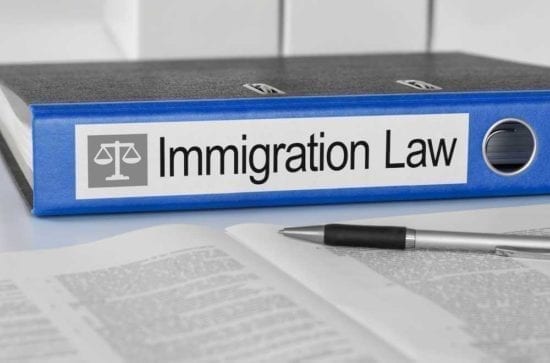What is a raid?
An ICE raid means agents go to one place to arrest certain people. A sweep means they go to many places and may arrest other people they find, even if they were not looking for them.
What is immigration enforcement?
Immigration enforcement is carried out by several agencies:
- Immigration and Customs Enforcement (ICE) can arrest, detain, and deport people whom they believe do not have permission to stay in the U.S.
- Customs and Border Protection (CBP) manages borders and checks documents at entry points.
- Department of Homeland Security (DHS) oversees ICE and CBP and sets policies.
- CBP, local police, sheriffs, USCIS special agents, and National Guard may now also help with immigration efforts. Some states, including Texas and Florida, have passed laws that expand immigration enforcement and allow or require local police to work with ICE.
Immigration arrests are going up across the United States. Some cities and states are seeing more ICE activity than before, such as Charlotte, Chicago, D.C., Los Angeles, Maine, and Minneapolis.
Who is at risk?
Recent changes mean more people will be targeted by immigration enforcement:
- Undocumented immigrants without legal status are most at risk, especially those who:
- Have final removal orders or prior deportation orders.
- Have been in the U.S. for less than 2 years.
- Have any type of criminal record, even for minor offenses.
You can still be detained and deported if none of these apply to you. Many immigrants who have been detained do not have a criminal record
- Green Card holders with a criminal conviction, such as driving under the influence, firearm or drug possession, theft, or violent crime. This can even be for an old case or one that did not require jail time.
- Refugees in the U.S who have not adjusted to a Green Card are at higher risk. ICE had been detaining refugees in Minnesota, but a court has temporarily blocked the arrests of refugees.
- Asylum seekers near the U.S.-Mexico border. Even if you are seeking asylum, you will still likely be detained and made to remain in Mexico.
- Immigrants with visa violations, such as those working without authorization. DHS considers overstaying your visa to be a violation. ICE can then detain you, even if you have a pending application for another immigration status.
- Immigrants with a status that ends, such as those who lose humanitarian parole or temporary protected status.
ICE has been told to detain more people and start deportation cases for almost everyone they arrest. This includes detaining people with work permits, pending immigration cases, asylum applications, strong family ties, family with legal status, humanitarian needs, or medical issues. Pregnant people, caregivers, and long-time residents have all been detained under these new rules.
U.S. Citizens and others have been detained during raids, protests, and other settings. ICE may hold U.S. citizens until it can confirm their citizenship status. ICE cannot deport U.S. citizens.

ICE raids and immigration enforcement are changing under the new government. Stay informed about what is happening now.
What to expect
Knowing what to expect can help you stay calm and prepared.
- ICE agents may try to stop and arrest you at your home, work, on the streets, at a traffic stop, in courthouses, or at check-ins.
- Raids can also now happen in schools, hospitals, and places of worship.
- ICE arrests are also often happening after local police arrest someone, because police share information with immigration authorities.
- ICE agents often come early in the morning. Agents may knock loudly or go door to door and keep coming back.
- ICE arrests can be sudden and confusing. Agents often give little information about what is happening or what will happen next.
- Many ICE agents dress in plain clothes, drive unmarked cars, and cover their faces with masks. They do not always wear uniforms.
- ICE agents may act like they are police or probation officers. They may not say they are ICE at first. You have the right to ask to see their badge and identification before answering questions.
- ICE does not always follow the rules, protocols, or laws they are supposed to follow. They may lie or use intimidation to try to gain entry or search you. They may even try to force their way in without a warrant.
- ICE may use facial scans to identify people during arrests, even if you show documents.
If you believe your rights have been violated, write down what happened or ask a witness to do so. If you can, report the violation to a lawyer or immigrant rights organization.
It is important to learn your basic rights, know how to protect yourself in different situations, and create a safety plan now. Keep reading to learn how to prepare yourself.
An internal ICE memo signed last week says agents could make an arrest without a judge-signed warrant. We will share more information on this when we know more.
Zijue haki zako za msingi
Regardless of your immigration status, you have rights:
- Right to remain silent. You do not have to answer questions about where you were born or how you entered the U.S. This is true everywhere except at the border or an airport. (In some states, you may be required to provide your name if asked to identify yourself.)
- Right to refuse a search without a warrant signed by a judge. You can refuse a search of yourself, your home, your car, and your belongings, but police may pat down your clothing if they suspect a weapon.
- Right to speak with a lawyer, but if you are detained by ICE, the government is not required to provide you with a lawyer. (If you are arrested by police, you have the right to a government-appointed lawyer.)
- Learn more about your basic rights and immigrant rights.
General tips to protect yourself
- Stay calm and polite. You do not have to answer questions or discuss your immigration status with the police or immigration officers.
- Ask if you are free to leave. If the answer is “yes,” calmly walk away. If the answer is “no,” do not walk or run away and stay where you are. You may then choose to use your right to remain silent.
- Ask to see a warrant. They can hold it up to a window or slide it under the door. To enter your home, they must have a judicial warrant.
- Understand the 3 different types of warrants. A judicial warrant is signed by a judge and may allow police to arrest someone or search a place. It includes “search warrants.” An administrative warrant is signed by ICE or CBP, not a judge. It may allow an arrest in public, but it does not allow them to enter your home without permission. A Blackie’s warrant is signed by a judge and may allow officers to search certain areas of a workplace.
- Remember your rights. You can say “I want to speak to a lawyer and choose to remain silent.”
- Provide your identification when the law requires it. In most states, you must show a driver’s license if you are pulled over. If you are not a U.S. citizen and an immigration officer requests your immigration documentation, you must show them.
- Do not tell ICE how or where to find someone else. You do not need to lie. Just say “I can not answer that.”
- Record or document the encounter. Write down the names, badge numbers, and contact information of the officers involved.
Report a raid: Find a hotline in your state. Check the ICE raid tracker to view and report recent immigration raids in your area.
Avoid actions that could harm your case:
- Do not answer any unnecessary questions.
- Do not lie or provide false documents.
- Do not resist an arrest or search.
- Do not sign any paperwork without a lawyer.
- Do not reveal your country of nationality.
- Do not discuss your immigration status with anyone but your lawyer.
If ICE comes to your home, they will likely knock on your door and ask to speak with someone.
- Do not open the door. In general, the only two ways they can enter your home are with permission from someone in your home or a search warrant issued by a judge.
- Do not invite the officer into your home. If ICE says they are here to arrest someone or search your home, do not open the door. Tell everyone, including your children, not to open the door, as it may be seen as permission to enter.
- Ask for their identification and ask to look at the judicial warrant if they have one.
- Do not resist if ICE agents force their way in. Say “I do not consent to your entry,” but do not physically resist.
- Let them know if children or vulnerable individuals are in the house (if they enter with a proper warrant).
- Remember your basic rights and our general tips above.
- Find more helpful details with IDP’s Home Raid Guide.
A leaked U.S. government memo showed that ICE agents have been authorized to force their way into some people’s homes without a judge’s warrant, permission, or an emergency. This is against constitutional law. To stay safe, do not open the door unless ICE shows a warrant signed by a judge.
If you are pulled over while in your car, local police need reasonable suspicion for a stop, and immigration officers need a federal or immigration-related issue.
- Safely pull over: Stop the car as soon as it is safe, turn off the engine, turn on the interior light, open the window just a little, and keep your hands on the wheel.
- Provide required documents: If you are driving, show your driver’s license, registration, and proof of insurance. You have the right to remain silent about other details.
- Your car cannot be searched without a judicial warrant.
- Remember your basic rights and our general tips above.
If ICE stops you in a public space, such as a street or sidewalk, bus stop, or parking lot, you have rights:
- Remember your basic rights and our general tips above.
- Be aware that ICE agents have been pretending to offer jobs in Home Depot parking lots (or job centers) to arrest day laborers.
- Contact your local rapid response network for support. Have their number saved.
- Be aware of the added risk at airports. Immigration enforcement has increased at U.S. airports, including for flights within the U.S. The lists of people flying through U.S. airports may be shared with ICE, and ICE may detain people when they show up to fly.
- Know if you are at higher risk. You may be at higher risk at the airport if you have a past or current deportation order, an administrative warrant, or temporary protections such as DACA, TPS, a U visa, or a T visa. Some people are stopped even if the order is old or they did not know about it.
- Be prepared for questions. Immigration can question whether you have lawful immigration status and if you can enter the U.S.
- You have the right to seek asylum and should state if you fear returning to your home country clearly and loudly.
- Immigration can search your belongings for contraband and may take your fingerprints.
- Remember your basic rights and our general tips above.
Border Patrol has extra authority near the U.S. border. Encounters can happen at checkpoints or while traveling.
- Stay calm. Do not run, lie, or show false documents.
- At checkpoints, agents may stop you briefly and ask questions about your immigration status.
- At border crossings, agents can search your luggage or car.
- You have the right to speak to a lawyer.
- If you have valid immigration documents and are over 18, you may be required to carry them.
- Some people may face expedited removal (fast deportation). Ask why if this happens.
- You have the right to seek asylum and should state if you fear returning to your home country clearly and loudly.
If ICE comes to your work, they must generally have a search warrant or the permission of your employer to enter.
- Alert your supervisor if possible and continue working.
- You do not have to provide proof of employment.
- You have the right to refuse to form a line based on immigration status. If you are forced to move, do not resist.
- Remember your basic rights and our general tips above.
ICE officers are appearing at immigration courthouses and USCIS offices across the country and arresting people after their hearings and appointments. Immigration lawyers still say it is important to go to your court hearings and immigration appointments, but seek legal advice before if you are concerned.
Create a safety plan
Preparing a plan in advance can help protect you and your family.
Plan with trusted contacts
- Find and speak with an immigration lawyer: Get legal advice on whether you or a loved one qualifies for any relief against deportation. Memorize their number.
- Choose a trusted contact and memorize their number: Have a family member or friend who can manage your case and provide support if you are detained.
- Share key contact information: Make sure your trusted contact has phone numbers for your lawyer, union, consulate, and other critical services.
- Share your immigration “A” number and instructions for using the ICE detainee locator so your trusted contact can find you if you are detained.
Download the Ready Now app to create your personal emergency plan.
Prepare and protect your documents
- Make copies and store them in a safe place known to your trusted contact. This includes birth certificates, passports, and immigration records.
- Always carry important documents:
- Proof of your immigration status, such as a Green Card, I-94, visa, work permit, or I-797 Approval Notice.
- If your status is pending, carry a copy of receipts from USCIS, Form I-797.
- If in removal proceedings, carry a copy of your Notice of Hearing, receipts for applications filed, or a parole notice.
- If represented by a lawyer, carry signed copies of Form G-28 (Notice of Entry of Appearance as Attorney).
- If undocumented, proof that you have lived in the U.S. longer than 2 years (to avoid expedited removal). This can be a lease, utility bills, taxes, bank statements, medical records, or school records.
- Know Your Rights card.
- Carry copies of these documents so you do not risk losing or having originals taken by ICE.
- Do not carry false or foreign documents: Avoid carrying documents from another country (such as a foreign passport). These can be used against you in deportation proceedings.
Financial, medical, and digital preparedness
- Set aside money: Save funds for legal fees, bonds, and basic needs (food, toiletries) in case of detention.
- Plan for financial needs: Consider assigning a power of attorney so someone you trust can manage your finances if necessary.
- Back up images: Save your photos and videos to cloud storage so that interactions with ICE are documented and accessible without your phone.
- Plan for health needs: Write down your doctor’s contact information and details about your medications. Make sure your trusted contact can get your medical information if needed.
Plan for your children
- Arrange childcare: Identify at least two people who can care for your children if you are detained and write down their contact details. Provide your child’s school with the designated caregiver’s contact information.
- Secure important documents: Ensure your children have valid passports and travel consent forms. Share copies of their birth certificates, medical records, and any relevant information about special needs.
- Legal preparations: The process for legally choosing a guardian depends on where you live. Check your state’s requirements and consider completing a Caregiver Authorization Affidavit or other document to legally designate a guardian.
- Communicate with your children: Discuss what to expect and reassure them that they will be cared for if you are not available.

usahello.org/safety has more details on immigration changes, legal status options, preparing for raids and court, staying safe, and finding help.
Tips for sheltering in place
Some families are choosing to stay home because of fear or uncertainty around ICE activity, especially in areas like Minneapolis, where there is increased ICE activity.
Here are some tips:
- Food and essentials: Local food banks and schools may deliver free meals to your home.
- School: Families can ask schools about online classes, laptops, internet access, printed materials, and language support. Find free online learning resources.
- Medical care: Schedule phone or video appointments through community clinics. Ask pharmacies about home delivery for prescriptions and medications. Find mental health support and hotlines online.
- Staying connected: Contact local mutual aid groups or rapid response networks for direct support. Call 211 or visit 211.org for local help.
- Remember your rights at home.
Be prepared when you are detained
ICE may move you quickly and not tell you where you are going right away. They may take you to another detention center, even in another state. Families may be separated during arrest or after.
If you are detained by ICE or CBP, remember to:
- Use your right to remain silent.
- Ask to speak to a lawyer.
- Do not sign any documents without speaking to a lawyer first.
- Inform officers if you have children and any medical issues.
- Ask to call your trusted contact.
- Know your rights in an immigration detention center.
Save the Immigration Detention Hotline: 209-757-3733 or 9233# from a detention facility phone.
Tafuta msaada
If you fear deportation, seek help immediately. Many organizations and lawyers offer free or low-cost legal services.
- Learn how to find legal help.
- Know how to find a loved one in detention.
- Call a local hotline or national hotline for support:
- Immigration Detention Hotline: 209-757-3733 or 9233# from a detention facility phone.
- American Bar Association Detention Hotline: 202-442-3363 or 2150# from a detention facility phone.
- Check for live reports of ICE activity.
- Check your case status with EOIR.
- Join the Asylum Seeker Advocacy Project (ASAP).
- Get a Know Your Rights red card.
- Download NAKESEC Know Your Rights app that announces your rights.
Zaidi kutoka USAHello
Je, unatafuta taarifa mahususi?




